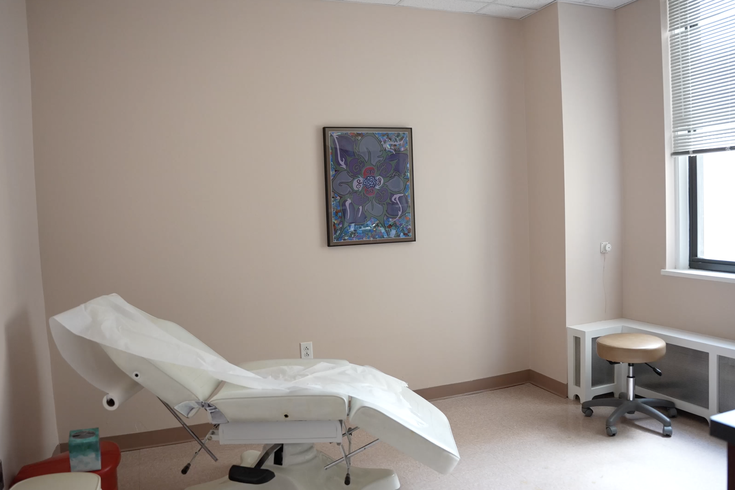
May 08, 2024
 Provided Image/Jefferson Health
Provided Image/Jefferson Health
A patient room at Jefferson's new Bridge Program clinic that treats people with substance use disorder.
Jefferson Health has established a coordinated, interdisciplinary, comprehensive care team to serve the complex health needs of people with substance use disorder.
The Stephen and Sandra Sheller Consult and Bridge Program, named after its philanthropists, offers a holistic approach to treating the medical needs of people with substance use disorder, who may also be experiencing homelessness. The program follows people through their medical care while they are inpatient and then steers them to a new outpatient clinic that acts as a primary care provider, making sure they don't slip through the cracks during transitions.
The Bridge Program is starting at a time when Philadelphia Mayor Cherelle Parker is trying to shut down the largest open-air drug market on the East Coast, in the city's Kensington neighborhood, where about 35% of the city's homeless population is located. The Parker administration has said it plans to invest $100 million to build a system of long-term care, treatment and housing for individuals suffering from addiction, mental health challenges and homelessness, although it has not been clear about the specifics.
The city continues to grapple with a record number of fatal drug overdoses that is in large part due to the deadly synthetic opioid fentanyl, which is 50 times more potent than heroin and has been flooding Philadelphia's, and the nation's, illicit drug supply. Fentanyl causes intense withdrawal symptoms between injections if there is a delay. Researchers at the University of Pennsylvania found that 1 in 6 patients with opioid use disorder were checking out of hospitals before medically advised, citing untreated withdrawal and pain as the primary reasons, putting them at a higher risk of being readmitted to the hospital or dying within 30 days.
That is the cycle the Bridge Program is trying to break by offering wrap-around services with "zero barriers," said Dr. Anna Flattau, chair of Family and Community Medicine at Jefferson. She described the program as an "ecosystem of care."
"There is a set of specific skills around helping people who quickly go into withdrawal and (who) have a lot of complex medical and social issues, to be safe, or safer, and to heal," Flattau said. "That involves really implementing best practices in different settings, the hospital, the emergency room, psychiatry, in the community, but also tying the services together."
When someone with a substance use disorder is hospitalized who the team thinks might be interested in its services, a certified recovery specialist – a person who is in recovery and trained in peer support – will see if the patient is interested in the Bridge Program. In addition to testing for hepatitis A, B and C, as well as for HIV, Jefferson Health offers patients withdrawal support to ease the intense discomfort of opioid withdrawal and will start people on medication for opioid use disorder (MOUD) in the hospital.
The Bridge Program also enables patients with complex medical needs to start PrEP, a medication to help reduce the chance of contracting HIV, and/or treatment for conditions like hepatitis C – while they are still in the hospital – something that doctors would normally be reluctant to offer this population of patients, not knowing if they were going to have consistent outpatient treatment.
"Hospital-based physicians are very reluctant to start new therapies if they don't know where the patient is going to end up, so if we can say this person is going to come and see us in the Bridge Program, then it's great to start the hepatitis C treatment. It's great to start them on PrEP to prevent HIV," said the Bridge Program's medical director, Dr. Lara Weinstein. "... Otherwise (physicians) would want to wait until someone was well established with an outpatient primary care practice to get these types of therapies, which, unfortunately for the folks we see, rarely if ever happened."
At the Bridge Program clinic, which is currently treating 45 patients, people can continue MOUD and also receive treatment for conditions such as high blood pressure, diabetes and other medical issues, as well as contraception management and counseling, behavioral health support and recovery support. The program's staff also helps people with food insecurity, legal assistance and housing.
"We kind of approach it with a one-stop shop with no wrong door, whatever-it-takes kind of approach," Weinstein said.
The Bridge clinic at 1015 Chestnut St. will be funded by a $1.5 million donation from the Sheller family for three to five years as a pilot program until sustainable payment models, such as through Medicaid, are in place.